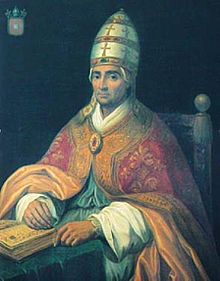Jacques Fournier
|
Pope Benedict XII |
|
|---|---|
 |
|
| Papacy began | 30 December 1334 |
| Papacy ended | 25 April 1342 |
| Predecessor | John XXII |
| Successor | Clement VI |
| Orders | |
| Created Cardinal | 18 December 1327 by John XXII |
| Personal details | |
| Birth name | Jacques Fournier |
| Born | c. 1280s Saverdun, Kingdom of France |
| Died | 25 April 1342 Avignon, County of Provence |
| Coat of arms |  |
|
Papal styles of Pope Benedict XII |
|
|---|---|
 |
|
| Reference style | His Holiness |
| Spoken style | Your Holiness |
| Religious style | Holy Father |
| Posthumous style | None |
Pope Benedict XII (Latin: Benedictus XII; died 25 April 1342), born Jacques Fournier, was Pope from 30 December 1334 to his death in April 1342. He was the third Avignon Pope. Benedict was a careful pope who reformed monastic orders and opposed nepotism. Unable to remove his capital to Rome or Bologna, he started the great palace at Avignon. He decided against a notion of Pope John XXII by saying that souls may attain the "fulness of the beatific vision" before the last judgment. He tried unsuccessfully to reunite the Greek and Roman churches. He also failed to come to an understanding with Louis IV, Holy Roman Emperor.
Little is known of the origins of Jacques Fournier. He is believed to have been born in Canté in the Comté de Foix around the 1280s to a family of modest means. He became a Cistercianmonk and left the countryside to study at the University of Paris. In 1311 he was made Abbot of Fontfroide Abbey and quickly became known for his intelligence and organizational ability. In 1317 he was made Bishop of Pamiers. There he undertook a rigorous hunt for Cathar heretics, such as Guillaume Bélibaste, which won him praise from religious authorities, but alienated the local people.
His efforts against the Cathars of Montaillou in the Ariège were carefully recorded in the Fournier Register, which he took to Rome and deposited in the Vatican Library. His transcription was edited by Jean Duvernoy and has been documented by Emmanuel Le Roy Ladurie's pioneering microhistory, Montaillou, village occitan.
...
Wikipedia
